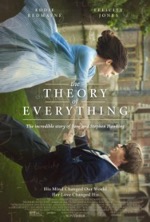The Theory of Everything (PG-13)
14/02/15 13:44 Filed in: 2014

Starring: Eddie Redmayne
November 2014
This review was originally tweeted in Real-time from the back row of a movie theater and appears @BackRoweReviews. Though efforts were made to tease rather than ruin this movie’s memorable lines and moments, some spoilers may exist in the following evaluation. The original tweets appear in black, while follow-up comments appear in red. For concerns over objectionable content, please first refer to one of the many parental movie guide websites. All ratings are based on a four star system. Happy reading!

Science meets Arts at a party.
They say opposites attract. Here it’s not only a contrast in field of study but also in political/religious views.
A test to separate the quarks from the quacks. Amusing.
David Thewlis, best know for his portrayal of Remus Lupin in the Harry Potter movies, is a really good journeyman actor and is perfect in the role of Hawking’s professor.
“Celestial dictator.” Hawking’s rather unflattering moniker for the Almighty.
He finds “your lack of faith disturbing.”
“A false conclusion.” True love, however, can never be false.
Proof positive that love isn’t logical or quantifiable. It’s the only thing in the universe that an equation can’t solve. In short, love is the theory of everything. A curious aside: in John Nash’s (Russell Crowe) final speech in A Beautiful Mind (2002), he refers to “the equations of the mind” and credits love as the answer and solution to life’s mysteries. Two brilliant contemporaries arriving at the same conclusion. Fascinating!
Chapter four is “brilliant.” Secures Hawking’s professorship.
Chapters 1-3? Eh.
Need stress relief? Join the church choir.
Hawking’s wife eventually does find relief from her stress…in the arms of the choir director. Scandalous? Look two tweets ahead.
A lesson in pees and potatoes.
Some of the science goes right over my head, but the vacillation of theories regarding divinity is amusing. First Hawking proves the existence of God and then the scientist kills the Almighty. Don’t worry, Stephen, He believes in you even if you don’t believe in Him.
Hawking gives his wife a hall pass.
That was really big of him. Sheesh, I didn’t mean it like that.
A spelling board...how quaint. And crude. What a torturous way to communicate.
Seems like an alphabet chart with a pointer or even a Ouija board would be more efficient.
Hawking slips into a coma...his own personal black hole.
“That is for a friend.” Nice cover.
Oops, I guess that’s a double entendre.
A dot matrix printer. What a blast to the past.
Slow, loud printing. Hard to read. Perforated edges that you had to tear. Don’t miss it at all.
“Look what we made.” Touching.
Final analysis: a bittersweet biopic that deals with personal tragedy and life’s big questions.
Rating: 3 out of 4. An inspirational tale and an astounding, body-wracking performance by Redmayne.
As a film that focuses on the extraordinary life and career of renowned theoretical physicist, Stephen Hawking, the story is exactly what you’d expect it to be: a chronological, cause and effect period piece with fine performances and a plot that’s diligently moored to the actual account. Some will consider this middle-of-the-plate approach to be acceptable while others will regard it as inexcusably uncomplicated and lacking in imagination. In either case, the plot is a linear progression of significant moments in the mathematician’s life and, as would be expected, the narrative proceeds in a very logical and methodical manner. Save for Hawking’s occasional mental flash of celestial lucidity, there’s very little style here. Since much of the story focuses on Hawking’s preoccupation with time, it would’ve been effective, even fitting, if the story had employed flashbacks, flash-forward’s, disjointed continuity or other causal devices in reflecting the fluid nature of the movie’s temporal plot. Mind you, I’m not advocating a reverse polarity plot like in Christopher Nolan’s Memento (2001), but maybe something with leaps forward or backward in time like TVs Lost would’ve served the movie in good stead. Standard storytelling choices aside, any serious discussion of the film begins and ends with Eddie Redmayne’s mesmerizing, transcendent portrayal of the ALS afflicted central character...due to the inherent physical demands of the part, Redmayne justly deserves the Oscar nod he’s received for this role. Redmayne’s nuanced, effortless depiction of Hawking’s gradual physical deterioration is a study in brilliance. It’s a performance that exacted a considerable toll from the actor—the contortions required to mimic Hawking’s degenerative condition must’ve been agonizing to model and maintain. Somatic challenges aside, Redmayne’s facials reveal a man who appears to be virtually unaffected by his malady. If this portrayal is accurate, Hawking is far more jovial and enthusiastic about life than most of us would be in his position. The fact that Hawking can still smile at all is truly inspirational. All in all, this is a decent film that’s a fitting tribute to one of the brightest minds of our generation. However, the movie lacks the narrative savvy required to effectively convey its chrono-centric theme. The logic over emotion methodology has resulted in a film that fails to make any deep, lasting connection with its audience. So, will this film go down as one of cinema’s finest biopics? Time will tell.